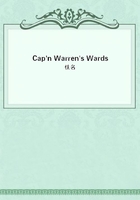
第72章
But, in spite of his promise, Sylvester did not report during the following week or the next. Meanwhile, his client tried his best to keep the new mystery from troubling his thoughts, and succeeded only partially. The captain's days and evenings were quiet and monotonous. He borrowed a book or two from Mrs. Hepton's meager library, read, walked a good deal, generally along the water front, and wrote daily letters to Miss Baker. He and Pearson were together for at least a portion of each day. The author, fighting down his dejection and discouragement, set himself resolutely to work once more on the novel, and his nautical adviser was called in for frequent consultation. The story, however, progressed but slowly. There was something lacking. Each knew what that something was, but neither named it.
One evening Pearson entered the room tenanted by his friend to find the latter seated beside the table, his shoes partially unlaced, and a pair of big slippers ready for putting on.
"Captain," said the visitor, "you look so comfortable I hate to disturb you."Captain Elisha, red-faced and panting, desisted from the unlacing and straightened in his chair.
"Whew!" he puffed. "Jim, your remarks prove that your experience of the world ain't as big as it ought to be. When you get to my age and waist measure you'll realize that stoopin' over and comfort don't go together. I hope to be comfortable pretty soon; but Isha'n't be till them boots are off. Set down. The agony'll be over in a minute."Pearson declined to sit. "Not yet," he said. "And you let those shoes alone, until you hear what I've got to say. A newspaper friend of mine has sent me two tickets for the opera to-night. Iwant you to go with me."
Captain Elisha was surprised.
"To the opera?" he repeated. "Why, that's a--a sort of singin'
theater ain't it?"
"Yes, you're fond of music; you told me so. And Aida is beautiful.
Come on! it will do us both good."
"Hum! Well, I don't know."
"I do. Get ready."
The captain looked at his caller's evening clothes.
"What do you mean by gettin' ready?" he asked. "You've got on your regimentals, open front and all. My uniform is the huntin' case kind; fits in better with church sociables and South Denboro no'theasters. If I wore one of those vests like yours Abbie'd make me put on a red flannel lung-protector to keep from catchin'
pneumonia. And she'd think 'twas sinful waste besides, runnin' the risk of sp'ilin' a clean biled shirt so quick. Won't I look like an undertaker, sittin' alongside of you?""Not a bit. If it will ease your mind I'll change to a business suit.""I don't care. You know how I feel; we had a little talk about hats a spell ago, you remember. If you're willin' to take me 'just as I am, without a plea,' as the hymn-tune says, why, I cal'late I'll say yes and go. Set down and wait while I get on my ceremonials."He retired to the curtain alcove, and Pearson heard him rustling about, evidently making a hurried change of raiment. During this process he talked continuously.
"Jim," he said, "I ain't been to the theater but once since Ilanded in New York. Then I went to see a play named 'The Heart of a Sailor.' Ha! ha! that was a great show! Ever take it in, did you?""No. I never did."
"Well, you'd ought to. It's a wonder of it's kind. I learned more things about life-savin' and 'longshore life from that drayma than you'd believe was possible. You'd have got some p'ints for your Cap'n Jim yarn from that play; you sartin would! Yes, indeed! Way I happened to go to it was on account of seein' a poster on a fence over nigh where that Moriarty tribe lived. The poster pictured a bark ashore, on her beam ends, in a sea like those off the Horn.
On the beach was a whole parcel of life-savers firin' off rockets and blue lights. Keepin' the Fourth of July, I judged they was, for I couldn't see any other reason. The bark wa'n't more'n a hundred foot from 'em, and if all hands on board didn't know they was in trouble by that time, then they deserved to drown. Anyhow, they wa'n't likely to appreciate the celebration. Ho! ho! Well, when I run afoul of that poster I felt I hadn't ought to let anything like that get away; so I hunted up the theater--it wa'n't but a little ways off--and got a front seat for that very afternoon.""Was it up to the advertising?" asked Pearson.
"WAS it? Hi hum! I wish you'd been there. More 'special I wished some of the folks from home had been there, for the whole business was supposed to happen on the Cape, and they'd have realized how ignorant we are about the place we live in. The hero was a strappin' six-footer, sort of a combination fisherman and parson, seemed so. He wore ileskins in fair weather and went around preachin' or defyin' folks that provoked him and makin' love to the daughter of a long-haired old relic that called himself an inventor. . . . Oh, consarn it!""What's the matter?"
"Dropped my collar button, as usual. Collar buttons are one of the Old Harry's pet traps. I'll bet their responsible for 'most as many lapses from grace as tangled fishlines. Where . . . Ow! . . .
All right; I found it with my bare foot, and edge up, of course."A series of grunts and short-breathed exclamations followed, indicating that the sufferer was struggling with a tight collar.
"Go on," commanded Pearson. "Tell me some more about the play.""Hey? Oh, the play. Where was I?"
"You were saying that the heroine's father was an inventor.""That's what HE said he was, though he never furnished any proof.